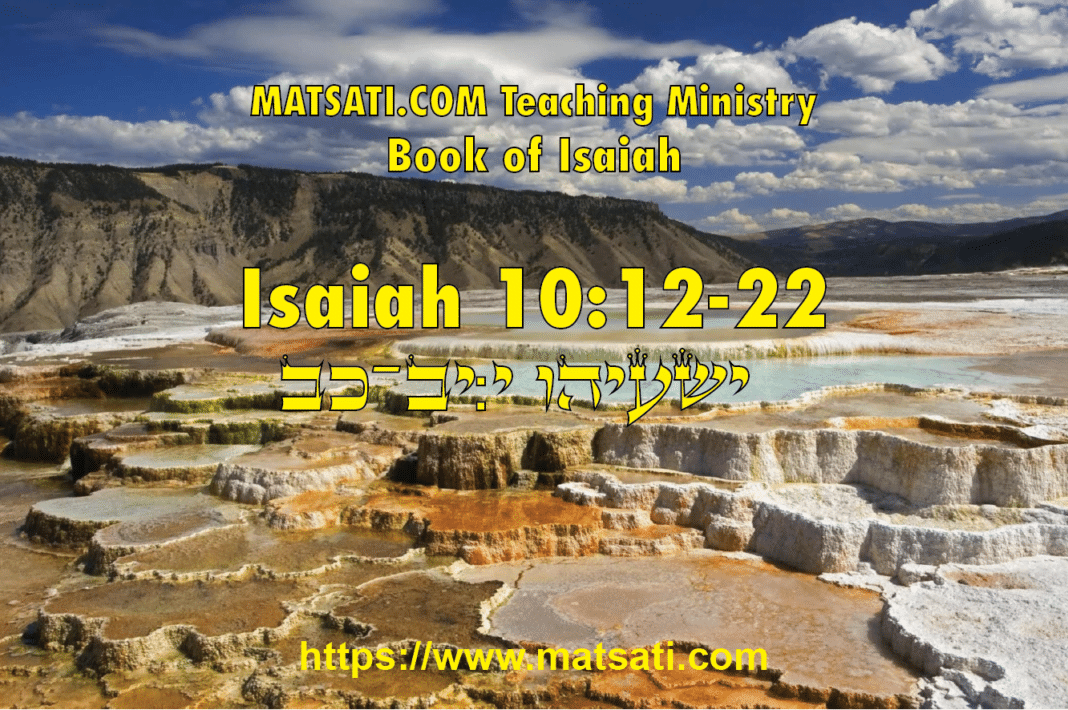Table of Contents
Introduction to Isaiah 10:12-22
Pride and arrogance that we are reading about Israel, Judah, and Jerusalem was not restricted to the nation of Israel, but the foreign nations that God was bringing to afflict Israel due to her sins were also plagued by these things. This was why the Lord first speaks about what He will bring to completion in Israel, Judah, and Jerusalem, and then He will bring the king of Assyria to account before Him. This is how Isaiah describes these things as he continues according to Isaiah 10:12.

ספר ישעיה פרק י
יב וְהָיָה כִּי-יְבַצַּע אֲדֹנָי אֶת-כָּל-מַעֲשֵֹהוּ בְּהַר צִיּוֹן וּבִירוּשָׁלָם אֶפְקֹד עַל-פְּרִי-גֹדֶל לְבַב מֶלֶךְ-אַשּׁוּר וְעַל-תִּפְאֶרֶת רוּם עֵינָיו:
Isaiah 10:12 states, “Wherefore it shall come to pass, (וְהָיָה) that when the Lord hath performed his whole work upon mount Zion and on Jerusalem, (כִּי-יְבַצַּע אֲדֹנָי אֶת-כָּל-מַעֲשֵֹהוּ בְּהַר צִיּוֹן) I will punish the fruit of the stout heart of the king of Assyria, (אֶפְקֹד עַל-פְּרִי-גֹדֶל לְבַב מֶלֶךְ-אַשּׁוּר) and the glory of his high looks. (וְעַל-תִּפְאֶרֶת רוּם עֵינָיו)” War is not pleasant regardless of whether it was brought by God to punish a nation or not. Assyria was arrogant, cruel, and was feared, this is why Isaiah writes אֶפְקֹד עַל-פְּרִי-גֹדֶל לְבַב מֶלֶךְ-אַשּׁוּר “I will punish the fruit of the stout heart of the king of Assyria.” Would this judgment that God brings upon Assyria be strictly the result of her pride? No! Judgment comes due to Assyria serving other gods, the refusal to acknowledge, believe in, and trust the One True God of Israel.
ספר ישעיה פרק י
יג כִּי אָמַר בְּכֹחַ יָדִי עָשִֹיתִי וּבְחָכְמָתִי כִּי נְבֻנוֹתִי וְאָסִיר | גְּבוּלֹת עַמִּים וַעֲתיּדֹתֵיהֶם [וַעֲתוּדוֹתֵיהֶם] שׁוֹשֵֹתִי וְאוֹרִיד כַּאבִּיר [כַּבִּיר] יוֹשְׁבִים:
Isaiah 10:13 states, “For he saith, By the strength of my hand I have done it, (כִּי אָמַר בְּכֹחַ יָדִי עָשִֹיתִי) and by my wisdom; for I am prudent: (וּבְחָכְמָתִי כִּי נְבֻנוֹתִי) and I have removed the bounds of the people, (וְאָסִיר | גְּבוּלֹת עַמִּים) and have robbed their treasures, (וַעֲתיּדֹתֵיהֶם [וַעֲתוּדוֹתֵיהֶם] שׁוֹשֵֹתִי) and I have put down the inhabitants like a valiant man: (וְאוֹרִיד כַּאבִּיר [כַּבִּיר] יוֹשְׁבִים)” We see how Isaiah points out as the Lord speaks through him saying, כִּי אָמַר בְּכֹחַ יָדִי עָשִֹיתִי וּבְחָכְמָתִי “For he saith, By the strength of my hand I have done it, and by my wisdom” reminding the people that the Lord God Almighty is behind these things.

ספר דברים פרק ח
יז וְאָמַרְתָּ בִּלְבָבֶךָ כֹּחִי וְעֹצֶם יָדִי עָשָֹה לִי אֶת-הַחַיִל הַזֶּה: יח וְזָכַרְתָּ אֶת-יְהוָֹה אֱלֹהֶיךָ כִּי הוּא הַנֹּתֵן לְךָ כֹּחַ לַעֲשֹוֹת חָיִל לְמַעַן הָקִים אֶת-בְּרִיתוֹ אֲשֶׁר-נִשְׁבַּע לַאֲבֹתֶיךָ כַּיּוֹם הַזֶּה: פ יט וְהָיָה אִם-שָׁכֹחַ תִּשְׁכַּח אֶת-יְהוָֹה אֱלֹהֶיךָ וְהָלַכְתָּ אַחֲרֵי אֱלֹהִים אֲחֵרִים וַעֲבַדְתָּם וְהִשְׁתַּחֲוִיתָ לָהֶם הַעִדֹתִי בָכֶם הַיּוֹם כִּי אָבֹד תֹּאבֵדוּן: כ כַּגּוֹיִם אֲשֶׁר יְהוָֹה מַאֲבִיד מִפְּנֵיכֶם כֵּן תֹּאבֵדוּן עֵקֶב לֹא תִשְׁמְעוּן בְּקוֹל יְהוָֹה אֱלֹהֵיכֶם:
Devarim / Deuteronomy 8:17-20
8:17 And thou say in thine heart, My power and the might of mine hand hath gotten me this wealth. 8:18 But thou shalt remember the LORD thy God: for it is he that giveth thee power to get wealth, that he may establish his covenant which he sware unto thy fathers, as it is this day. 8:19 And it shall be, if thou do at all forget the LORD thy God, and walk after other gods, and serve them, and worship them, I testify against you this day that ye shall surely perish. 8:20 As the nations which the LORD destroyeth before your face, so shall ye perish; because ye would not be obedient unto the voice of the LORD your God. (KJV)
Here in Parashat Ekev, we are reminded when Moshe says כֹּחִי וְעֹצֶם יָדִי עָשָֹה לִי אֶת-הַחַיִל הַזֶּה “My power and the might of mine hand hath gotten me this wealth” that it is not by our power and strength but by the Lord God Almighty working and living in our midst. Remember this Torah centric principle is being fulfilled by our faith in Yeshua the Messiah and consequently the indwelling of God’s Holy Spirit inside of us. We note that the remainder of Devarim / Deuteronomy 8 reveals that the God of Israel, our Father in heaven does these things for the purpose of bringing to fulfill His promises and His covenant. We note that by these things from Isaiah, that the Lord God is at work in this world as well even though some of the persons in whom he works do not know Him. We note also that ignorance is no excuse, the Torah states explicitly that one is guilty regardless of whether one knows he sins or not. (see Vayikra / Leviticus 5:17, יז וְאִם-נֶפֶשׁ כִּי תֶחֱטָא וְעָשְֹתָה אַחַת מִכָּל-מִצְוֹת יְהֹוָה אֲשֶׁר לֹא תֵעָשֶֹינָה וְלֹא-יָדַע וְאָשֵׁם וְנָשָֹא עֲוֹנוֹ:) We note the Hebrew bible states that even though he does not know, he is guilty and will bear that guilt before God! We note that this is the state of the Assyrian king and his people, and the state of many people today as well! They praise themselves because of their strength, their skill, and their abilities, forgetting the one who gives them their abilities, the creator of this world. Today there are those who look down on others judging others due to their own status in life, or their abilities, and devalue the preciousness of human life. This is the outcome of those who reject God’s Torah, one believes the lie that it is by his or her own power that one achieves success. According to the Torah God tells us the importance of listening to His voice as Moshe writes, כַּגּוֹיִם אֲשֶׁר יְהוָֹה מַאֲבִיד מִפְּנֵיכֶם כֵּן תֹּאבֵדוּן עֵקֶב לֹא תִשְׁמְעוּן בְּקוֹל יְהוָֹה אֱלֹהֵיכֶם “As the nations which the LORD destroyeth before your face, so shall ye perish; because ye would not be obedient unto the voice of the LORD your God.” What exactly does it mean to לֹא תִשְׁמְעוּן בְּקוֹל יְהוָֹה אֱלֹהֵיכֶם? We note that listening is synonymous to obeying, meaning that we are attempting to apply God’s Word to our lives because of all the things that He has done on our behalf, especially today in light of what our Father in heaven has done through His Son Yeshua! The power of God in our lives is found in listening to the Lord and living to bring glory to His name through acknowledging His authority, His testimony in our lives, and the glory of His power to help us to live for Him! This is what the Torah is all about, directing us to seek the Messiah of God, to believe in the Lord God of Israel who is able to overcome all things, even to deliver us from our own sins!
ספר ישעיה פרק י
יד וַתִּמְצָא כַקֵּן | יָדִי לְחֵיל הָעַמִּים וְכֶאֱסֹף בֵּיצִים עֲזֻבוֹת כָּל-הָאָרֶץ אֲנִי אָסָפְתִּי וְלֹא הָיָה נֹדֵד כָּנָף וּפֹצֶה פֶה וּמְצַפְצֵף: טו הֲיִתְפָּאֵר הַגַּרְזֶן עַל הַחֹצֵב בּוֹ אִם-יִתְגַּדֵּל הַמַּשּׂוֹר עַל-מְנִיפוֹ כְּהָנִיף שֵׁבֶט וְאֶת-מְרִימָיו כְּהָרִים מַטֶּה לֹא-עֵץ: טז לָכֵן יְשַׁלַּח הָאָדוֹן יְהֹוָה צְבָאוֹת בְּמִשְׁמַנָּיו רָזוֹן וְתַחַת כְּבֹדוֹ יֵקַד יְקֹד כִּיקוֹד אֵשׁ: יז וְהָיָה אוֹר-יִשְֹרָאֵל לְאֵשׁ וּקְדוֹשׁוֹ לְלֶהָבָה וּבָעֲרָה וְאָכְלָה שִׁיתוֹ וּשְׁמִירוֹ בְּיוֹם אֶחָד: יח וּכְבוֹד יַעְרוֹ וְכַרְמִלּוֹ מִנֶּפֶשׁ וְעַד-בָּשָֹר יְכַלֶּה וְהָיָה כִּמְסֹס נֹסֵס: יט וּשְׁאָר עֵץ יַעְרוֹ מִסְפָּר יִהְיוּ וְנַעַר יִכְתְּבֵם:
Isaiah 10:14 states, “And my hand hath found as a nest the riches of the people: (וַתִּמְצָא כַקֵּן | יָדִי לְחֵיל הָעַמִּים) and as one gathereth eggs that are left, have I gathered all the earth; (וְכֶאֱסֹף בֵּיצִים עֲזֻבוֹת כָּל-הָאָרֶץ אֲנִי אָסָפְתִּי) and there was none that moved the wing, or opened the mouth, or peeped. (וְלֹא הָיָה נֹדֵד כָּנָף וּפֹצֶה פֶה וּמְצַפְצֵף)” Isaiah 10:15 “Shall the axe boast itself against him that heweth therewith? (הֲיִתְפָּאֵר הַגַּרְזֶן עַל הַחֹצֵב בּוֹ) or shall the saw magnify itself against him that shaketh it? (אִם-יִתְגַּדֵּל הַמַּשּׂוֹר עַל-מְנִיפוֹ) as if the rod should shake itself against them that lift it up, or as if the staff should lift up itself, as if it were no wood. (כְּהָנִיף שֵׁבֶט וְאֶת-מְרִימָיו כְּהָרִים מַטֶּה לֹא-עֵץ)” Isaiah 10:16 “Therefore shall the Lord, the Lord of hosts, send among his fat ones leanness; (לָכֵן יְשַׁלַּח הָאָדוֹן יְהֹוָה צְבָאוֹת בְּמִשְׁמַנָּיו רָזוֹן) and under his glory he shall kindle a burning like the burning of a fire. (וְתַחַת כְּבֹדוֹ יֵקַד יְקֹד כִּיקוֹד אֵשׁ)” Isaiah 10:17 “And the light of Israel shall be for a fire, (וְהָיָה אוֹר-יִשְֹרָאֵל לְאֵשׁ) and his Holy One for a flame: (וּקְדוֹשׁוֹ לְלֶהָבָה) and it shall burn and devour his thorns and his briers in one day; (וּבָעֲרָה וְאָכְלָה שִׁיתוֹ וּשְׁמִירוֹ בְּיוֹם אֶחָד)” Isaiah 10:18 “And shall consume the glory of his forest, and of his fruitful field, (וּכְבוֹד יַעְרוֹ וְכַרְמִלּוֹ) both soul and body: (מִנֶּפֶשׁ וְעַד-בָּשָֹר יְכַלֶּה) and they shall be as when a standard-bearer fainteth. (וְהָיָה כִּמְסֹס נֹסֵס)” Isaiah 10:19 “And the rest of the trees of his forest shall be few, (וּשְׁאָר עֵץ יַעְרוֹ מִסְפָּר) that a child may write them. (יִהְיוּ וְנַעַר יִכְתְּבֵם)”
Notice how the Lord God gives examples through Isaiah. According to Isaiah 10:14, the Lord speaks of His power and authority over all of the earth! We are told throughout scripture that the Creator God has authority over man and all of creation.

ספר ישעיה פרק מה
יח כִּ֣י כֹ֣ה אָֽמַר־יְ֠הוָה בּוֹרֵ֨א הַשָּׁמַ֜יִם ה֣וּא הָאֱלֹהִ֗ים יֹצֵ֨ר הָאָ֤רֶץ וְעֹשָׂהּ֙ ה֣וּא כֽוֹנְנָ֔הּ לֹא־תֹ֥הוּ בְרָאָ֖הּ לָשֶׁ֣בֶת יְצָרָ֑הּ אֲנִ֥י יְהוָ֖ה וְאֵ֥ין עֽוֹד׃
Isaiah 45:18
45:18 For thus saith the LORD that created the heavens; God himself that formed the earth and made it; he hath established it, he created it not in vain, he formed it to be inhabited: I am the LORD; and there is none else.
This explains to us why the Lord God in heaven is the ultimate authority. The Lord God alone is sovereign over all the world’s nations, and we are told that He has given “All authority in heaven and on earth” to His Son, Yeshua the Messiah (Matthew 28:18, see also Daniel 7:14 and Revelation 1:5). Yeshua is reigning everywhere right now from His throne in Heaven.
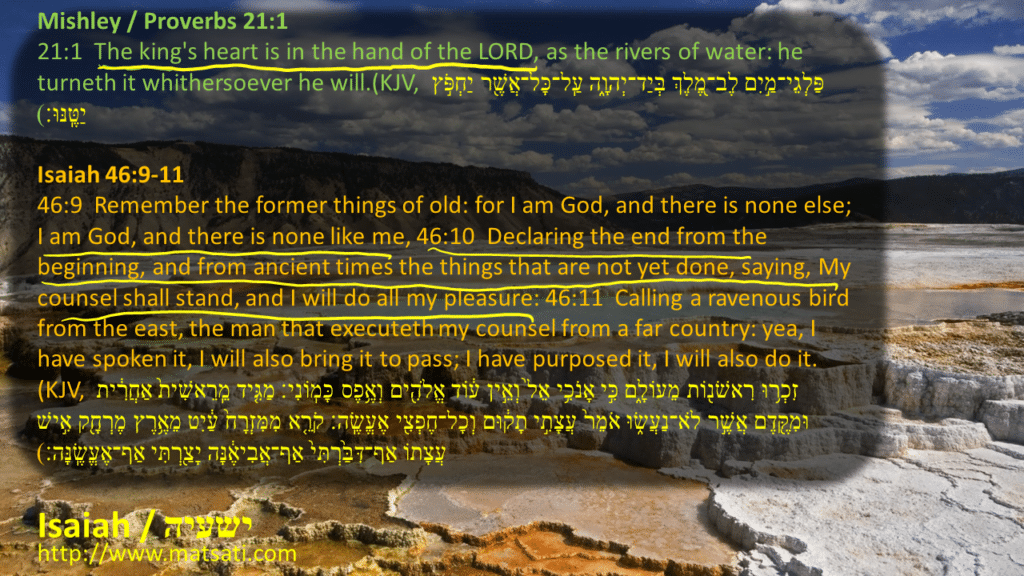
Mishley / Proverbs 21:1
21:1 The king’s heart is in the hand of the LORD, as the rivers of water: he turneth it whithersoever he will.(KJV, פַּלְגֵי־מַ֣יִם לֶב־מֶ֭לֶךְ בְּיַד־יְהוָ֑ה עַֽל־כָּל־אֲשֶׁ֖ר יַחְפֹּ֣ץ יַטֶּֽנּוּ׃)
Isaiah 46:9-11
46:9 Remember the former things of old: for I am God, and there is none else; I am God, and there is none like me, 46:10 Declaring the end from the beginning, and from ancient times the things that are not yet done, saying, My counsel shall stand, and I will do all my pleasure: 46:11 Calling a ravenous bird from the east, the man that executeth my counsel from a far country: yea, I have spoken it, I will also bring it to pass; I have purposed it, I will also do it. (KJV, זִכְר֥וּ רִאשֹׁנ֖וֹת מֵעוֹלָ֑ם כִּ֣י אָנֹכִ֥י אֵל֙ וְאֵ֣ין ע֔וֹד אֱלֹהִ֖ים וְאֶ֥פֶס כָּמֽוֹנִי׃ מַגִּ֤יד מֵֽרֵאשִׁית֙ אַחֲרִ֔ית וּמִקֶּ֖דֶם אֲשֶׁ֣ר לֹא־נַעֲשׂ֑וּ אֹמֵר֙ עֲצָתִ֣י תָק֔וּם וְכָל־חֶפְצִ֖י אֶעֱשֶֽׂה׃ קֹרֵ֤א מִמִּזְרָח֙ עַ֔יִט מֵאֶ֥רֶץ מֶרְחָ֖ק אִ֣ישׁ עֲצָתוֹ אַף־דִּבַּ֙רְתִּי֙ אַף־אֲבִיאֶ֔נָּה יָצַ֖רְתִּי אַף־אֶעֱשֶֽׂנָּה׃)
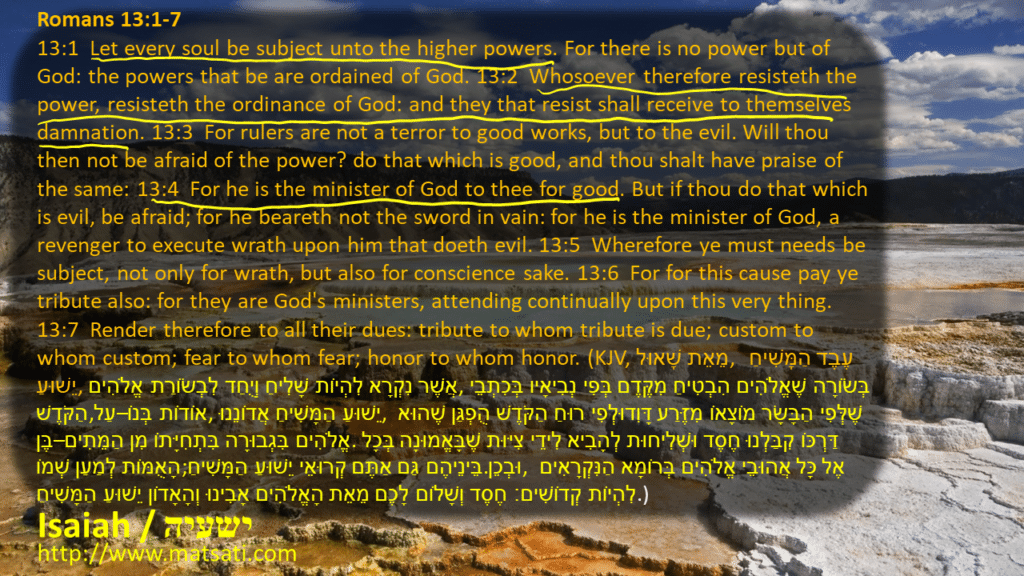
Romans 13:1-7
13:1 Let every soul be subject unto the higher powers. For there is no power but of God: the powers that be are ordained of God. 13:2 Whosoever therefore resisteth the power, resisteth the ordinance of God: and they that resist shall receive to themselves damnation. 13:3 For rulers are not a terror to good works, but to the evil. Will thou then not be afraid of the power? do that which is good, and thou shalt have praise of the same: 13:4 For he is the minister of God to thee for good. But if thou do that which is evil, be afraid; for he beareth not the sword in vain: for he is the minister of God, a revenger to execute wrath upon him that doeth evil. 13:5 Wherefore ye must needs be subject, not only for wrath, but also for conscience sake. 13:6 For for this cause pay ye tribute also: for they are God’s ministers, attending continually upon this very thing. 13:7 Render therefore to all their dues: tribute to whom tribute is due; custom to whom custom; fear to whom fear; honor to whom honor. (KJV, מֵאֵת שָׁאוּל, עֶבֶד הַמָּשִׁיחַ יֵשׁוּעַ, אֲשֶׁר נִקְרָא לִהְיוֹת שָׁלִיחַ וְיֻחַד לִבְשׂוֹרַת אֱלֹהִים,בְּשׂוֹרָה שֶׁאֱלֹהִים הִבְטִיחַ מִקֶּדֶם בְּפִי נְבִיאָיו בְּכִתְבֵי הַקֹּדֶשׁ,עַל–אוֹדוֹת בְּנוֹ, יֵשׁוּעַ הַמָּשִׁיחַ אֲדוֹנֵנוּ, שֶׁלְּפִי הַבָּשָׂר מוֹצָאוֹ מִזֶּרַע דָּוִדוּלְפִי רוּחַ הַקֹּדֶשׁ הֻפְגַּן שֶׁהוּא בֶּן–אֱלֹהִים בִּגְבוּרָה בִּתְחִיָּתוֹ מִן הַמֵּתִים.דַּרְכּוֹ קִבַּלְנוּ חֶסֶד וּשְׁלִיחוּת לְהָבִיא לִידֵי צִיּוּת שֶׁבָּאֱמוּנָה בְּכָל הָאֻמּוֹת לְמַעַן שְׁמוֹ;בֵּינֵיהֶם גַּם אַתֶּם קְרוּאֵי יֵשׁוּעַ הַמָּשִׁיחַ.וּבְכֵן, אֶל כָּל אֲהוּבֵי אֱלֹהִים בְּרוֹמָא הַנִּקְרָאִים לִהְיוֹת קְדוֹשִׁים׃ חֶסֶד וְשָׁלוֹם לָכֶם מֵאֵת הָאֱלֹהִים אָבִינוּ וְהָאָדוֹן יֵשׁוּעַ הַמָּשִׁיחַ.)
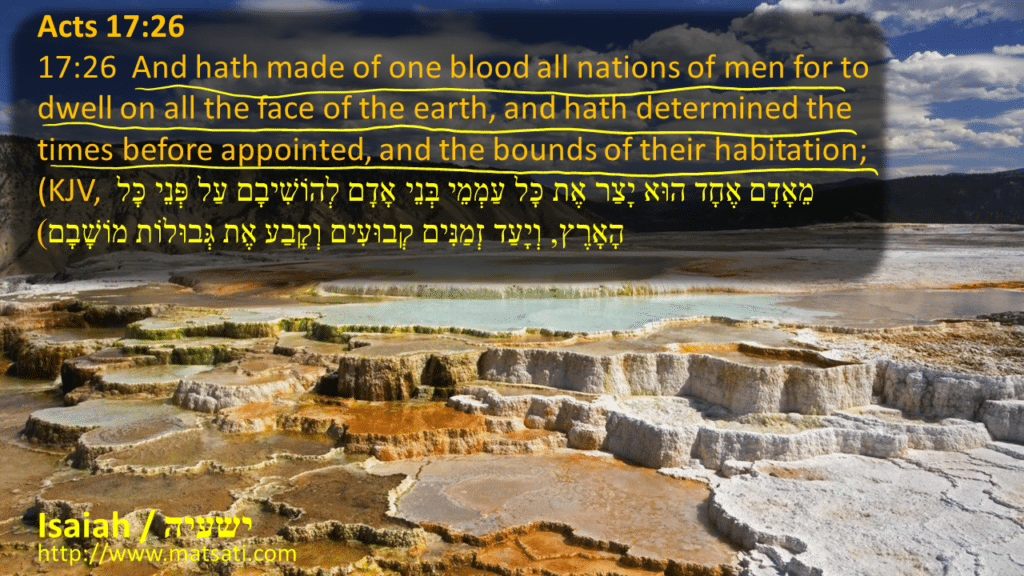
Acts 17:26
17:26 And hath made of one blood all nations of men for to dwell on all the face of the earth, and hath determined the times before appointed, and the bounds of their habitation; (KJV, מֵאָדָם אֶחָד הוּא יָצַר אֶת כָּל עַמְמֵי בְּנֵי אָדָם לְהוֹשִׁיבָם עַל פְּנֵי כָּל הָאָרֶץ, וְיָעַד זְמַנִּים קְבוּעִים וְקָבַע אֶת גְּבוּלוֹת מוֹשָׁבָם)
We note how these few verses indicate that God is sovereign due to His being the creator, He works in hearts of men, He puts people into places of power over others, He made all men of one blood, from one man Adam, and ultimately, He is the beginning and the end, He is the creator, just as Isaiah says, כִּ֣י אָנֹכִ֥י אֵל֙ וְאֵ֣ין ע֔וֹד אֱלֹהִ֖ים וְאֶ֥פֶס כָּמֽוֹנִי׃ מַגִּ֤יד מֵֽרֵאשִׁית֙ אַחֲרִ֔ית וּמִקֶּ֖דֶם אֲשֶׁ֣ר לֹא־נַעֲשׂ֑וּ “I am God, and there is none else; I am God, and there is none like me, Declaring the end from the beginning, and from ancient times the things that are not yet done.” These things suggest that the Lord knows all, even the arrogance of the Assyrian nation and its leaders. This arrogance always leads to self-reliance, and not trusting in Him. Because the Lord God of Israel is our authority in every area, we need to make sure that we know what His Word says and strive to make it our authority in every area of our lives. This is so important, as God’s Word can help us to recognize when the beliefs and philosophies of men stand in opposition and are contrary to God’s Word (Colossians 2:8; Ephesians 4:14). This is why Paul wrote that we are to bring “every thought into captivity to the obedience of Christ,” (2 Corinthians 10:5), and respond by “speaking the truth in love” (Ephesians 4:15) to a world that has tried to deny the authority of the Almighty Father in heaven!
We note here a parallel to what Paul wrote, טו הֲיִתְפָּאֵר הַגַּרְזֶן עַל הַחֹצֵב בּוֹ אִם-יִתְגַּדֵּל הַמַּשּׂוֹר עַל-מְנִיפוֹ כְּהָנִיף שֵׁבֶט וְאֶת-מְרִימָיו כְּהָרִים מַטֶּה לֹא-עֵץ: Isaiah “10:15 Shall the axe boast itself against him that heweth therewith? (הֲיִתְפָּאֵר הַגַּרְזֶן עַל הַחֹצֵב בּוֹ) or shall the saw magnify itself against him that shaketh it? (אִם-יִתְגַּדֵּל הַמַּשּׂוֹר עַל-מְנִיפוֹ) as if the rod should shake itself against them that lift it up, or as if the staff should lift up itself, as if it were no wood. (כְּהָנִיף שֵׁבֶט וְאֶת-מְרִימָיו כְּהָרִים מַטֶּה לֹא-עֵץ)”
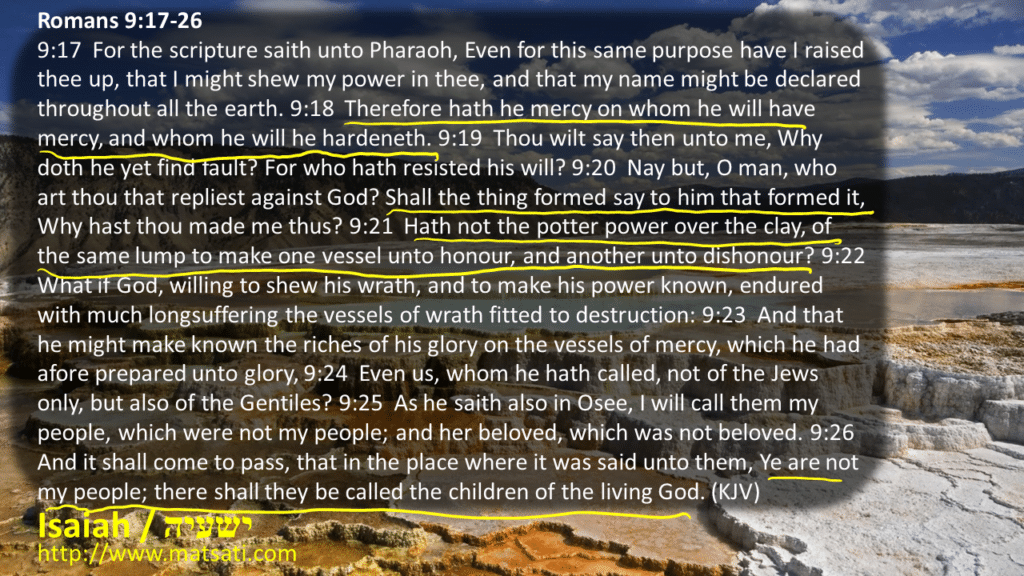
Romans 9:17-26
9:17 For the scripture saith unto Pharaoh, Even for this same purpose have I raised thee up, that I might shew my power in thee, and that my name might be declared throughout all the earth. 9:18 Therefore hath he mercy on whom he will have mercy, and whom he will he hardeneth. 9:19 Thou wilt say then unto me, Why doth he yet find fault? For who hath resisted his will? 9:20 Nay but, O man, who art thou that repliest against God? Shall the thing formed say to him that formed it, Why hast thou made me thus? 9:21 Hath not the potter power over the clay, of the same lump to make one vessel unto honour, and another unto dishonour? 9:22 What if God, willing to shew his wrath, and to make his power known, endured with much longsuffering the vessels of wrath fitted to destruction: 9:23 And that he might make known the riches of his glory on the vessels of mercy, which he had afore prepared unto glory, 9:24 Even us, whom he hath called, not of the Jews only, but also of the Gentiles? 9:25 As he saith also in Osee, I will call them my people, which were not my people; and her beloved, which was not beloved. 9:26 And it shall come to pass, that in the place where it was said unto them, Ye are not my people; there shall they be called the children of the living God. (KJV, וְאָכֵן אוֹמֵר הַכָּתוּב לְפַרְעֹה׃ ״בַּעֲבוּר זֹאת הֶעֱמַדְתִּיךָ, בַּעֲבוּר הַרְאֹתְךָ אֶת כֹּחִי, וּלְמַעַן סַפֵּר שְׁמִי בְּכָל–הָאָרֶץ.״ (שמות ט׳ טז׳) 18 וּבְכֵן הוּא מְרַחֵם עַל מִי שֶׁהוּא רוֹצֶה, וּמַקְשֶׁה אֶת לֵב מִי שֶׁהוּא רוֹצֶה.19 אֲזַי אַתָּה תֹּאמַר לִי׃ ״מַדּוּעַ הוּא עוֹד מַאֲשִׁים, שֶׁהֲרֵי מִי יַעֲמֹד נֶגֶד רְצוֹנוֹ?״ 20 אַךְ מִי אַתָּה, בֶּן–אָדָם, כִּי תִּתְוַכֵּחַ עִם אֱלֹהִים? הַאִם יֹאמַר מַעֲשֶׂה לְעוֹשֵׂהוּ ״מַדּוּעַ כָּכָה עֲשִׂיתָנִי?״ 21 הַאִם מֵאוֹתוֹ חֹמֶר אֵין יוֹצֵר רַשַּׁאי לִיצֹר כְּלִי אֶחָד לְכָבוֹד, וּכְלִי אַחֵר לְשִׁמּוּשׁ שֶׁאֵין בּוֹ כָּבוֹד? 22 וּמָה אִם אֱלֹהִים, אַף כִּי חָפֵץ לְהַרְאוֹת אֶת זַעְמוֹ וּלְגַלּוֹת אֶת כֹּחוֹ, סָבַל בְּאֹרֶךְ רוּחַ רַב כְּלֵי זַעַם מוּכָנִים לַהֶרֶס, 23 כְּדֵי לְגַלּוֹת אֶת עֹשֶׁר כְּבוֹדוֹ בִּכְלֵי חֲנִינָה שֶׁמֵּרֹאשׁ הֵכִין אוֹתָם לְכָבוֹד? –– 24 כְּלוֹמַר, אוֹתָנוּ אֲשֶׁר גַּם קָרָא לֹא רַק מִקֶּרֶב הַיְּהוּדִים אֶלָּא גַּם מִקֶּרֶב הַגּוֹיִים, 25 כְּמוֹ שֶׁהוּא אוֹמֵר גַּם בְּהוֹשֵׁעַ׃ ״אֶקְרָא לְלֹא–עַמִּי עַמִּי, וּלְלֹא–רֻחָמָה רֻחָמָה. (הושע ב׳ כה׳) 26 וְהָיָה בִּמְקוֹם אֲשֶׁר–יֵאָמֵר לָהֶם לֹא–עַמִּי אַתֶּם, יֵאָמֵר לָהֶם בְּנֵי אֵל–חָי.״ (הושע ב׳ א׳, ג׳))
Here Paul uses a similar analogy to the potter and the clay. We are the clay, and God is the potter. These things describe how the Lord God is the one who makes us and has authority over our lives regardless of who we are. We note Isaiah 10:17-19 state saying, יז וְהָיָה אוֹר-יִשְֹרָאֵל לְאֵשׁ וּקְדוֹשׁוֹ לְלֶהָבָה וּבָעֲרָה וְאָכְלָה שִׁיתוֹ וּשְׁמִירוֹ בְּיוֹם אֶחָד: יח וּכְבוֹד יַעְרוֹ וְכַרְמִלּוֹ מִנֶּפֶשׁ וְעַד-בָּשָֹר יְכַלֶּה וְהָיָה כִּמְסֹס נֹסֵס: יט וּשְׁאָר עֵץ יַעְרוֹ מִסְפָּר יִהְיוּ וְנַעַר יִכְתְּבֵם: Isaiah 10:17 “And the light of Israel shall be for a fire, (וְהָיָה אוֹר-יִשְֹרָאֵל לְאֵשׁ) and his Holy One for a flame: (וּקְדוֹשׁוֹ לְלֶהָבָה) and it shall burn and devour his thorns and his briers in one day; (וּבָעֲרָה וְאָכְלָה שִׁיתוֹ וּשְׁמִירוֹ בְּיוֹם אֶחָד)” Isaiah 10:18 “And shall consume the glory of his forest, and of his fruitful field, (וּכְבוֹד יַעְרוֹ וְכַרְמִלּוֹ) both soul and body: (מִנֶּפֶשׁ וְעַד-בָּשָֹר יְכַלֶּה) and they shall be as when a standard-bearer fainteth. (וְהָיָה כִּמְסֹס נֹסֵס)” Isaiah 10:19 “And the rest of the trees of his forest shall be few, (וּשְׁאָר עֵץ יַעְרוֹ מִסְפָּר) that a child may write them. (יִהְיוּ וְנַעַר יִכְתְּבֵם)” This idea of consuming both body and soul, this reminds us of Yeshua’s words according to Matthew 10:26-28.
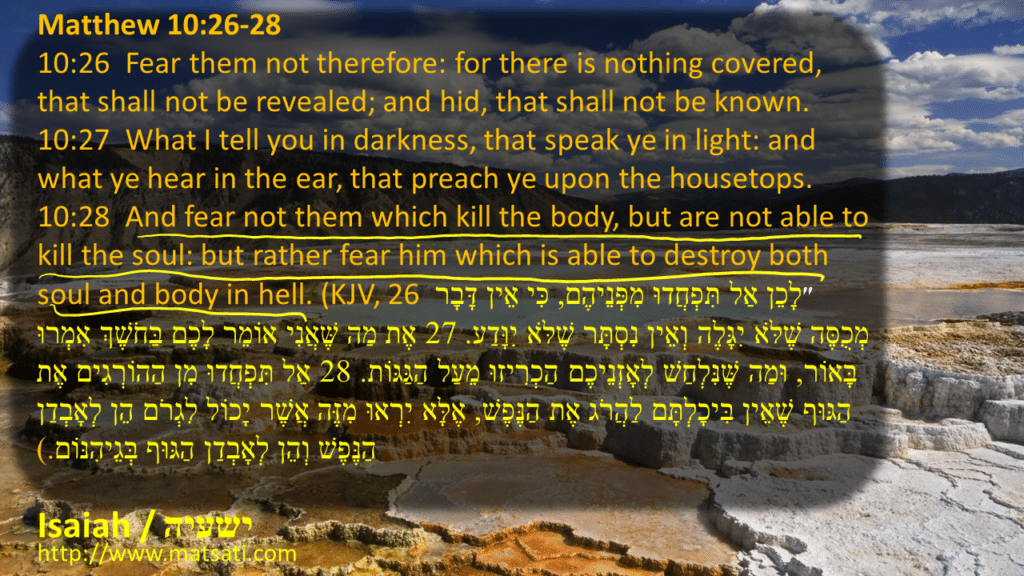
Matthew 10:26-28
10:26 Fear them not therefore: for there is nothing covered, that shall not be revealed; and hid, that shall not be known. 10:27 What I tell you in darkness, that speak ye in light: and what ye hear in the ear, that preach ye upon the housetops. 10:28 And fear not them which kill the body, but are not able to kill the soul: but rather fear him which is able to destroy both soul and body in hell. (KJV, 26 ״לָכֵן אַל תִּפְחֲדוּ מִפְּנֵיהֶם, כִּי אֵין דָּבָר מְכֻסֶּה שֶׁלֹּא יִגָּלֶה וְאֵין נִסְתָּר שֶׁלֹּא יִוָּדַע. 27 אֶת מַה שֶּׁאֲנִי אוֹמֵר לָכֶם בַּחֹשֶׁךְ אִמְרוּ בָּאוֹר, וּמַה שֶּׁנִּלְחַשׁ לְאָזְנֵיכֶם הַכְרִיזוּ מֵעַל הַגַּגּוֹת. 28 אַל תִּפְחֲדוּ מִן הַהוֹרְגִים אֶת הַגּוּף שֶׁאֵין בִּיכָלְתָּם לַהֲרֹג אֶת הַנֶּפֶשׁ, אֶלָּא יִרְאוּ מִזֶּה אֲשֶׁר יָכוֹל לִגְרֹם הֵן לְאָבְדַן הַנֶּפֶשׁ וְהֵן לְאָבְדַן הַגּוּף בְּגֵיהִנּוֹם.)
The Lord God having sovereignty over our lives, He is powerful to destroy both the body and the soul, therefore fear not. Again Isaiah is speaking of God’s ultimate authority over our lives. These rulers that came against Israel, Tiglath-pileser, Sargon, or Sennacherib in antiquity, even the enemy that comes to us today, the Lord God is ultimately in control, and He has a plan for this we can be sure and so again we are able to trust in the Lord! Isaiah describes God’s consuming power, His glory described as the light, will consume the glory of the nations. The thorns and briars are those who do not trust in the Lord, who do not produce the fruit of the spirit, and live in pride, arrogance, and look down upon other people, these are those who will be consumed, the analogy to the briar in the fire. Note also יט וּשְׁאָר עֵץ יַעְרוֹ מִסְפָּר יִהְיוּ וְנַעַר יִכְתְּבֵם “And the rest of the trees of his forest shall be few, that a child may write them.” This reminds us of the few who are saved, those who place their trust in the Lord believing in His Messiah Yeshua will be saved!
ספר ישעיה פרק י
כ וְהָיָה | בַּיּוֹם הַהוּא לֹא-יוֹסִיף עוֹד שְׁאָר יִשְֹרָאֵל וּפְלֵיטַת בֵּית-יַעֲקֹב לְהִשָּׁעֵן עַל-מַכֵּהוּ וְנִשְׁעַן עַל-יְהֹוָה קְדוֹשׁ יִשְֹרָאֵל בֶּאֱמֶת:
Isaiah 10:20 states, “And it shall come to pass in that day, (וְהָיָה | בַּיּוֹם הַהוּא) that the remnant of Israel, and such as are escaped of the house of Jacob, (לֹא-יוֹסִיף עוֹד שְׁאָר יִשְֹרָאֵל וּפְלֵיטַת בֵּית-יַעֲקֹב) shall no more again stay upon him that smote them; but shall stay upon the LORD, the Holy One of Israel, in truth. (לְהִשָּׁעֵן עַל-מַכֵּהוּ וְנִשְׁעַן עַל-יְהֹוָה קְדוֹשׁ יִשְֹרָאֵל בֶּאֱמֶת)” Here we are told about the שְׁאָר יִשְֹרָאֵל “remnant of Israel” and we know that a remnant is a leftover portion referring to a group of people in this context. In the biblical context, the remnant is looked upon with great favor, value, and holiness. These are those whom the Lord sets aside for His holy purposes, those whom they label as remnants. Remember the context of Ezekiel 20:37-38 and Zechariah 13:8-9, that the remnant in at this time was 1/3 of the nation, where 2/3 of the nation were those who rebelled against the Lord, who trust in themselves, and live in unrepentant sin. These things suggest that if the Lord God had ever allowed the remnant to disappear, the nation would be utterly destroyed. This is reminiscent of the minion, the 10 righteous men upon which the entire world is founded, which also follows the Bereshit / Genesis 18 narrative on Sodom and Gomorrah. In the Apostolic Writings, we see this similar analogy, where Paul writes saying, “Though the number of the Israelites be like the sand by the sea, only the remnant will be saved. For the Lord will carry out His sentence on earth with speed and finality” (Romans 9:27-28). These things imply that great multitudes of not just Israel, but all the world would be cast off. If only a remnant was to be saved, many must be lost, and this was just the point which Paul was endeavoring to establish. This is why it is so important to strive for the righteousness and holiness of God. Out of the great multitude of the peoples of this earth, there will be so few left as to make it proper to say that it was a mere remnant. Remember Isaiah’s son, his name was וּשְׁאָ֖ר יָשׁ֣וּב Shear-jashub, “a remnant will return.” (Isaiah 7:3) Isaiah even had this concept in mind while naming his son, this was supposed to be a tell-tale-sign for Ahaz to return to the Lord God of Israel. John Oswalt states, “G. Hasel has shown, the remnant motif occurs frequently in Assyrian texts, where it was used in a wholly negative sense to describe the thoroughness of their conquest.” Here the term remnant is a reference to those who overcome, and we note that those who overcome are those who remain in the Lord! It is only by the power of God in our lives that we are able to overcome and prevail until the end! The warning here to Ahaz, and to us in our modern times, is that we must trust in the Lord, or the enemy will gobble us up. This is why this term for remnant is eternal, surviving the span of history in relation to God’s people, the holy remnant who seek the Lord and His holy and righteous ways! Isaiah is looking forward to the day when Israel will return to the Lord, where Judah and Jerusalem are wise enough to put their trust in the Lord God Almighty, the Holy One of Israel, and commit their lives to the Lord in all their ways!
ספר ישעיה פרק י
כא שְׁאָר יָשׁוּב שְׁאָר יַעֲקֹב אֶל-אֵל גִּבּוֹר: כב כִּי אִם-יִהְיֶה עַמְּךָ יִשְֹרָאֵל כְּחוֹל הַיָּם שְׁאָר יָשׁוּב בּוֹ כִּלָּיוֹן חָרוּץ שׁוֹטֵף צְדָקָה:
Isaiah 10:21 states, “The remnant shall return, even the remnant of Jacob, (שְׁאָר יָשׁוּב שְׁאָר יַעֲקֹב) unto the mighty God. (אֶל-אֵל גִּבּוֹר)” Isaiah 10:22 “For though thy people Israel be as the sand of the sea, (כִּי אִם-יִהְיֶה עַמְּךָ יִשְֹרָאֵל כְּחוֹל הַיָּם) yet a remnant of them shall return: the consumption decreed shall overflow with righteousness. (שְׁאָר יָשׁוּב בּוֹ כִּלָּיוֹן חָרוּץ שׁוֹטֵף צְדָקָה)” Here Isaiah states explicitly that it is the remnant who will return to the mighty God! Isaiah uses his son’s name שְׁאָר יָשׁוּב Shear-jashub, directing us to understand that the Lord continues to call us to turn from our sinful ways and return to the ways of God, seeking Him and His Messiah! The Lord God always calling to us is a fulfillment of His ancient promises, to never forsake us, but always calling us to Himself. This is the love that God shows towards us and how God has established His salvation in His Messiah Yeshua. The continued mercy of God on our lives is meant for our repentance, and this is the reality of the power and goodness of God! Again, we see the comparison to the large quantity of people to the remnant who will survive, כִּי אִם-יִהְיֶה עַמְּךָ יִשְֹרָאֵל כְּחוֹל הַיָּם שְׁאָר יָשׁוּב בּוֹ “For though thy people Israel be as the sand of the sea, yet a remnant of them shall return” this is the mercy of God to not utterly annihilate. Note again the promises to Abraham (see Bereshit / Genesis 22:17, 32:12). Note that for those who are unfaithful, these promises are being fulfilled in the time that is given to repent. Without repentance there is no salvation. In Yeshua’s day, there were some who believed the promise God gave to Abraham (Luke 3:7-9) but their lives did not produce the fruit of repentance as John is saying according to Luke 3:7-9. We note that destruction is declared because of sin and unrepentant. The righteous see the Lord God and His Holy Ways, and trust in Him and in His presence in their lives to overcome sin! This is the position of righteousness, to trust in the Lord God in heaven, to believe in His Son Yeshua the Messiah, and to receive the Holy Spirit of God who empowers us and causes us to desire to live our lives for Him. Those who do not see these things in their lives are not saved but living a lie, just as Isaiah is pointing out to the people of Judah and Jerusalem in that time period. Here Paul ties this section of Isaiah into His letter to the Romans in chapter 9 verse 27.
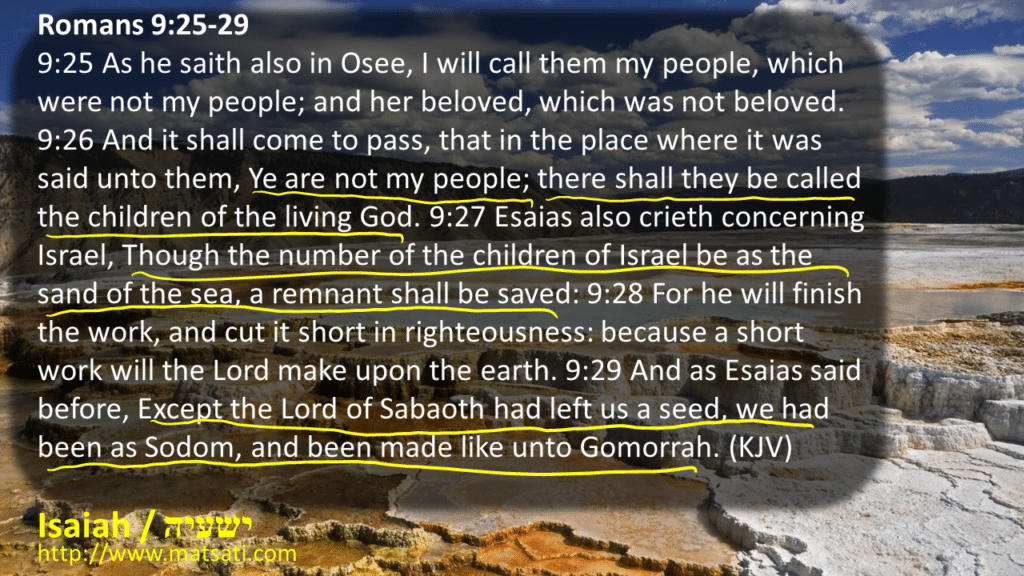
Romans 9:25-29
9:25 As he saith also in Osee, I will call them my people, which were not my people; and her beloved, which was not beloved. 9:26 And it shall come to pass, that in the place where it was said unto them, Ye are not my people; there shall they be called the children of the living God. 9:27 Esaias also crieth concerning Israel, Though the number of the children of Israel be as the sand of the sea, a remnant shall be saved: 9:28 For he will finish the work, and cut it short in righteousness: because a short work will the Lord make upon the earth. 9:29 And as Esaias said before, Except the Lord of Sabaoth had left us a seed, we had been as Sodoma, and been made like unto Gomorrah. (KJV)
Here in Romans 9:27 Paul writes about the Lord calling the Gentiles to believe in the Messiah and while at the same time saying a “Remnant shall be saved” (Isaiah 10:22) that is from the house of Israel.
Rabbinic Commentary on Isaiah 10:12-22
The Targum Jonathan is a rabbinic interpretation of the book of Isaiah and so it is important to study this text as well.
תרגום יונתן בן עוזיאל אל ישעיה פרק ט:א-י
יב וִיהֵי אְרֵי יְשֵיצֵי יוי לְמַעְבַד יָת כָל דַאְמַר בְטוּרָא דְצִיֹון וּבִירוּשְלַם אַסעַר עַל עוּבָדֵי רָם לִיבָא דְמַלכָא דְאַתוּר וְעַל תוּשבְחָת רָמוּת עֵינֹוהִי׃ יג אְרֵי אְמַר בִתקֹוף יְדִי עְבַדִית וְבחָכמְתִי אְרֵי סוּכלְתָן אְנָא וְאַגלִיתִי עַמְמַיָא מִמְדִינָא לִמדִינָא וְקִרוֵי תוּשבְחָתְהֹון בַזִית וְאַחֵיתִית בִתקֹוף יָת יָתְבֵי כַרכִין תַקִיפִין׃ יד וְאַשכַחַת כְקִינָא יְדִי נִכסֵי עַמְמַיָא וּכמִכנַש בֵיעִין שְבִיקָן כָל דָייְרֵי אַרעָא אְנָא כְנַשֵית וְלָא הְוָה נָטֵיל מִיכָא וְשָרֵי כָא וּפָתַח פוּמֵיה וּממַלֵיל מִלָא׃ טו הְאִפשַר דְיִשתַבַח חֹולֵילָא עַל דְחָלֵיל בֵיה לְמֵימַר הְלָא אְנָא חַללֵית אִם יִתרָרַב מַסָרָא עַל דְנָגיֵד בֵיה לְמֵימַר הְלָא אְנָא נַגדֵית כַאְרָמָא חוּטרָא לְמִמחֵי לָא חוּטרָא מָחֵי אְלָהֵין מַן דְמָחֵי בֵיה׃ טז חְלָף דְאִתרָרַב מַלכָא דְאַתוּר בְכֵין יְשַלַח רִבֹון עָלְמָא יוי צְבָאֹות בְרַברְבֹוהִי מַחָא וּתחֹות יְקָרְהֹון מֵיקָד ייֵקְדוּן כִיקֵידַת אַשָא׃ ותחות יקרהון דאינון יקרהון דבני נשא יז וִיהֵי מָרֵיה נְהֹורֵיה דְיִשׂרָאֵל וְקַדִישֵיה מֵימְרֵיה תַקִיף כְאִישָתָא וּפִתגָמֹוהִי כְשַלהָבִיתָא וִיקַטֵיל וִישֵיצֵי שִלטֹונֹוהִי וְטוּרנֹוהִי בְיֹומָא חַד׃ יח וִיקָר עַם סְגֵי מַשרְיָתיֵה וְעָבְדֵי קְרָביֵה נַפשְהֹון עִם פַגרְהֹון יְשֵיצֵי וִיהֵי תְבִיר וְעָרִיק׃ יט וּשאָר עָבְדֵי קְרָבֵיה יְסוּפוּן לְמִהוֵי עַם דְמִניָן וּמַלכוּ חַלָשָא יִתחַשבוּן׃ כ וִיהֵי בְעִידָנָא הַהוּא לָא יֹוסְפוּן עֹוד שְאָרָא דְיִשׂרָאֵל וְשֵיזָבַת בֵית יַעְקֹב לְאִסתְמָכָא עַל עַמְמַיָא דַהְוֹו מַפלְחִין בְהֹון וְיִסתַמכוּן עַל מֵימְרָא דַיוי קַדִישָא דְיִשׂרָאֵל בִקשֹוט׃ כא שְאָר דְלָא חְטֹו וּדתָבוּ מֵחִטאָה שְאָרָא דְבֵית יַעְקֹב יְתוּבוּן לְמִפלַח קֳדָם אְלָהָא גִיבָרָא׃ כב אְרֵי אִם יְהֵי עַמָך יִשׂרָאֵל סַגִי כְחָלָא דְיַמָא שְאָר דְלָא חְטֹו וּדתָבוּ מֵחִטאָה יִתעַבדָן לְהֹון גְבוּרָן דְמִתגַבְרָן וּמִידַבְרָן בְזָכוּ׃
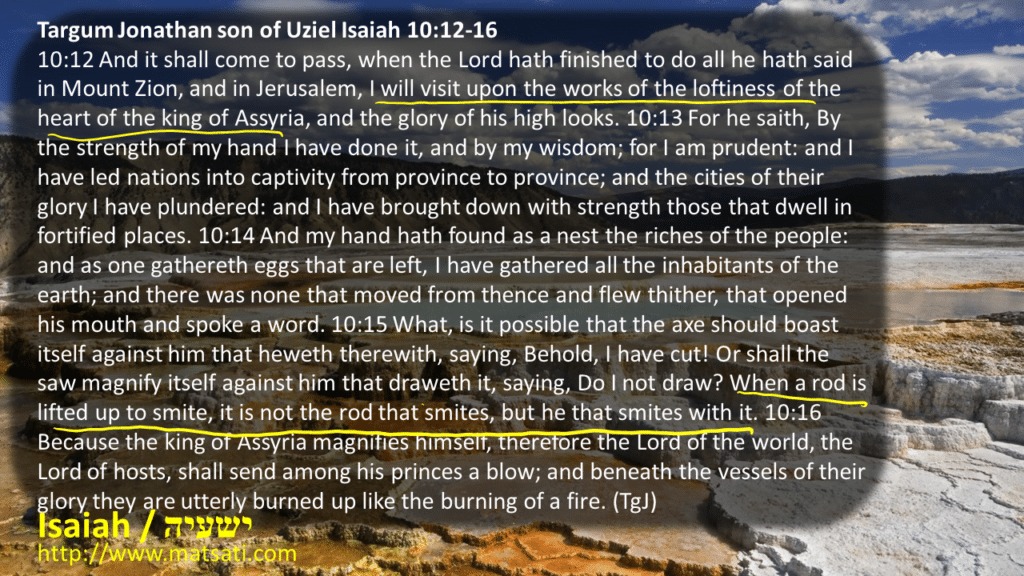
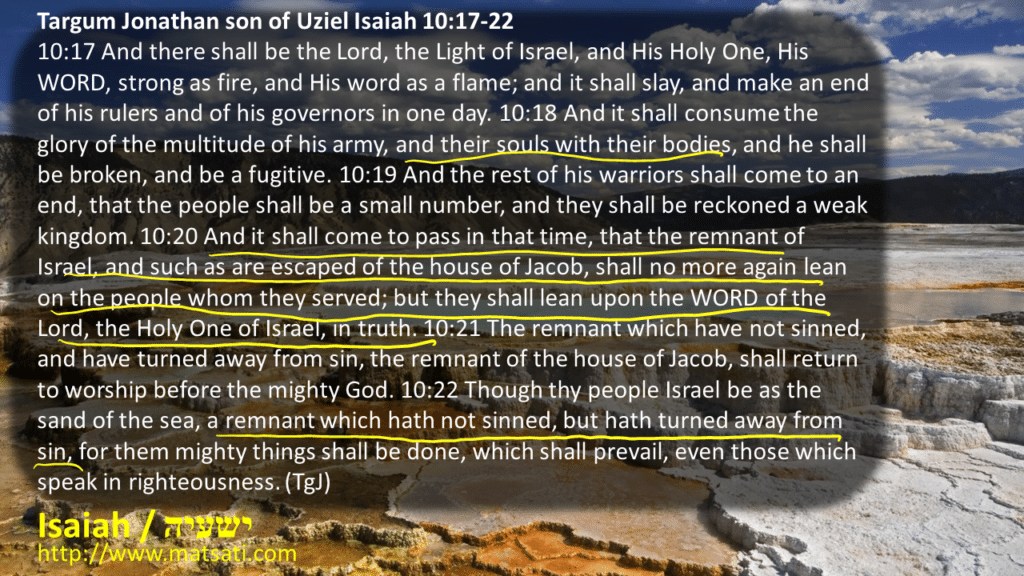
Targum Jonathan son of Uziel Isaiah 10:12-22
10:12 And it shall come to pass, when the Lord hath finished to do all he hath said in Mount Zion, and in Jerusalem, I will visit upon the works of the loftiness of the heart of the king of Assyria, and the glory of his high looks. 10:13 For he saith, By the strength of my hand I have done it, and by my wisdom; for I am prudent: and I have led nations into captivity from province to province; and the cities of their glory I have plundered: and I have brought down with strength those that dwell in fortified places. 10:14 And my hand hath found as a nest the riches of the people: and as one gathereth eggs that are left, I have gathered all the inhabitants of the earth; and there was none that moved from thence and flew thither, that opened his mouth and spoke a word. 10:15 What, is it possible that the axe should boast itself against him that heweth therewith, saying, Behold, I have cut! Or shall the saw magnify itself against him that draweth it, saying, Do I not draw? When a rod is lifted up to smite, it is not the rod that smites, but he that smites with it. 10:16 Because the king of Assyria magnifies himself, therefore the Lord of the world, the Lord of hosts, shall send among his princes a blow; and beneath the vessels of their glory they are utterly burned up like the burning of a fire. 10:17 And there shall be the Lord, the Light of Israel, and His Holy One, His WORD, strong as fire, and His word as a flame; and it shall slay, and make an end of his rulers and of his governors in one day. 10:18 And it shall consume the glory of the multitude of his army, and their souls with their bodies, and he shall be broken, and be a fugitive. 10:19 And the rest of his warriors shall come to an end, that the people shall be a small number, and they shall be reckoned a weak kingdom. 10:20 And it shall come to pass in that time, that the remnant of Israel, and such as are escaped of the house of Jacob, shall no more again lean on the people whom they served; but they shall lean upon the WORD of the Lord, the Holy One of Israel, in truth. 10:21 The remnant which have not sinned, and have turned away from sin, the remnant of the house of Jacob, shall return to worship before the mighty God. 10:22 Though thy people Israel be as the sand of the sea, a remnant which hath not sinned, but hath turned away from sin, for them mighty things shall be done, which shall prevail, even those which speak in righteousness. (TgJ)
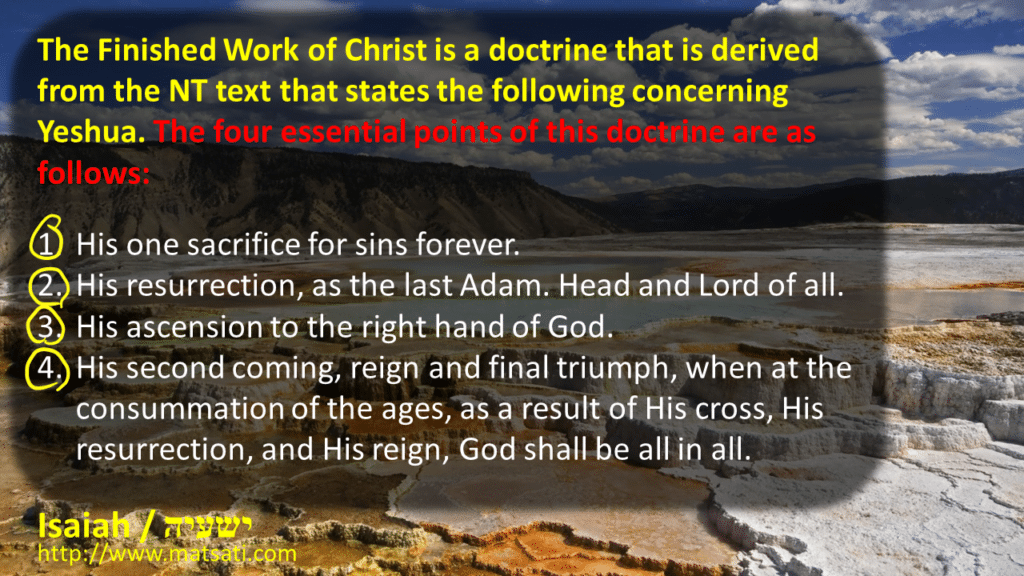
Isaiah opens according to TgJ saying, יב וִיהֵי אְרֵי יְשֵיצֵי יוי לְמַעְבַד יָת כָל דַאְמַר בְטוּרָא דְצִיֹון וּבִירוּשְלַם אַסעַר עַל עוּבָדֵי רָם לִיבָא דְמַלכָא דְאַתוּר וְעַל תוּשבְחָת רָמוּת עֵינֹוהִי׃ 10:12 And it shall come to pass, when the Lord hath finished to do all he hath said in Mount Zion, and in Jerusalem, I will visit upon the works of the loftiness of the heart of the king of Assyria, and the glory of his high looks. (TgJ) We note based on this text that God’s work was not finished, as He was bringing judgment upon Judah and Jerusalem, after having completed this He would move on to Assyria, the nation he caused to move against the people, all due to the sins, pride, and arrogance of all these people. These things remind us of unfinished work and finished work. According to the NT text, the finished work reminds us of the finished work of the Messiah. The Finished Work of Christ is a doctrine that is derived from the NT text that states the following concerning Yeshua. The four essential points of this doctrine are as follows:
- His one sacrifice for sins forever.
- His resurrection, as the last Adam. Head and Lord of all.
- His ascension to the right hand of God.
- His second coming, reign and final triumph, when at the consummation of the ages, as a result of His cross, His resurrection, and His reign, God shall be all in all.
It is interesting when considering the different church denominations’ views on these things, the discussion always leads to questions on sanctification, salvation, and works. There seems to be quite a bit of confusion over what Yeshua did for us as sanctifying and justifying us before God our Father in heaven and then what is expected of us here on earth. Because of this, many believe that by what Yeshua did for us in heaven, this exempts us from sanctifying our lives here on earth (i.e. striving for righteousness and holiness according to the Scriptures). The difficulty for nominal Christianity is the false doctrine that man earned his salvation while under the Torah. This is a major stumbling block today for understanding what God expects from us as His people. The point is that since we are sanctified in heaven, we are to also live sanctified lives here on earth; this is something that we are called to as His people. Paul writes according to Romans 12:1-3 that we are to be living sacrifices. What exactly does this mean? This is a very important question! To be a sacrifice means to set ourselves apart for the service of the Lord, to lay one’s life down for the Lord, and we do this by walking in His holy and righteous ways according to the Scriptures. Sin still has its consequences here on earth, just as the apostle John wrote according to 1 John 1:5 This is the message we have heard from him and declare to you: God is light; in him there is no darkness at all. 1:6 If we claim to have fellowship with him and yet walk in the darkness, we lie and do not live out the truth. 1:7 But if we walk in the light, as he is in the light, we have fellowship with one another, and the blood of Jesus, his Son, purifies us from all sin. (NIV) If one does not live in the light, but continues to walk in darkness, then the Lord is going to move in his or her life in such a way as to draw us back, giving time for repentance, just as we see taking place here in Isaiah. When living in continual unrepentance, something more drastic will be necessary, such as what we are seeing here in Isaiah 10:12. Rashi discusses these things saying the following:
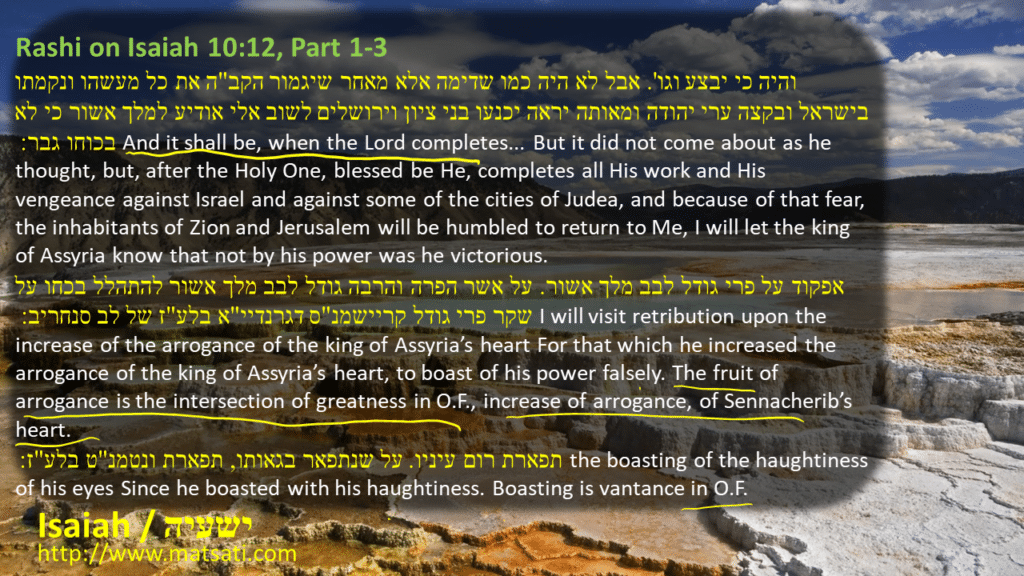
Rashi on Isaiah 10:12, Part 1-3
והיה כי יבצע וגו’. אבל לא היה כמו שדימה אלא מאחר שיגמור הקב”ה את כל מעשהו ונקמתו בישראל ובקצה ערי יהודה ומאותה יראה יכנעו בני ציון וירושלים לשוב אלי אודיע למלך אשור כי לא בכוחו גבר: And it shall be, when the Lord completes… But it did not come about as he thought, but, after the Holy One, blessed be He, completes all His work and His vengeance against Israel and against some of the cities of Judea, and because of that fear, the inhabitants of Zion and Jerusalem will be humbled to return to Me, I will let the king of Assyria know that not by his power was he victorious.
אפקוד על פרי גודל לבב מלך אשור. על אשר הפרה והרבה גודל לבב מלך אשור להתהלל בכחו על שקר פרי גודל קריישמנ”ס דגרנדיי”א בלע”ז של לב סנחריב: I will visit retribution upon the increase of the arrogance of the king of Assyria’s heart For that which he increased the arrogance of the king of Assyria’s heart, to boast of his power falsely. The fruit of arrogance is the intersection of greatness in O.F., increase of arrogance, of Sennacherib’s heart.
תפארת רום עיניו. על שנתפאר בגאותו, תפארת ונטמנ”ט בלע”ז: the boasting of the haughtiness of his eyes Since he boasted with his haughtiness. Boasting is vantance in O.F.
Note Rashi’s conclusion is these things are being brought to Judah and Jerusalem so that the people are humbled and return to the Lord and His ways. We note how these things suggest sin will make itself known or be made known in one way or another. Sin disrupts our relationships with God because it causes us to reject him. When it isn’t so apparent, the corruption of sin begins to manifest itself in different ways. Midrash Tanchuma Metzora 4:1 discusses this issue in terms of the leper.
Midrash Tanchuma, Metzora 4:1
(Lev. 14:2:) “This shall be the law of the leper.” Let our master instruct us: For how many things does leprosy come? Thus have our masters taught: The affliction comes [upon one] for eleven things:23Cf. Numb. R. 7:5; Lev. 17:3; ‘Arakh. 16a. (1) For idolatry, (2) for desecration of the name [of God], (3) for unchastity, (4) for theft, (5) for slander, (6) for false witness, (7) upon24In this passage “for” and “upon” translate the same Hebrew word (‘al). the judge who perverts justice, (8) for swearing in vain, (9) upon one who enters a domain which is not his, (10) upon one who thinks false thoughts, and (11) upon one who instigates quarrels among brothers. And some also say, “for the evil eye (i.e., for being miserly).” How is it shown [that leprosy comes] for idolatry? In that, when they made the calf, they were afflicted with leprosy. Thus it is stated (in Exod. 32:25), “Now Moses saw that the people were riotous (parua’)”; and it is written concerning the leper (in Lev. 13:45), “his head shall be unkempt (parua’).” And how is it shown [that leprosy comes] for cursing the name? From Goliath, of whom it is stated that he said in (I Sam. 17:8), “Choose a man (‘ish) for yourselves.” Now man (‘ish) can only be the Holy One, blessed be He, since it is stated (in Exod. 15:3), “The Lord is a man (‘ish) of war.” It is also written (in I Sam. 17:46) “This day [the Lord] will deliver (rt.: sgr) you.” Now deliverance can only imply leprosy, since it is stated (in Lev. 13:5), “the priest shall isolate (rt.: sgr) him.” And how is it shown for unchastity? Where it is written (in Is. 3:[16-]17), “[Because the daughters of Zion are haughty, and walk with extended neck and roving eyes…]. Therefore the Lord will smite with sores (sph) the scalps [of the daughters of Zion].”25Vs. 17 differs here from the Masoretic Text by replacing the divine name with Adonay (LORD). Now sores (sph) can only be leprosy, as stated (in Lev. 14:56), “For a swelling and for a sore (rt.: sph) and for a bright spot.” How is it shown for theft? Where it is stated (in Zech. 5:4), “I have sent it (i.e., the curse of the flying scroll in vs. 1) forth, says the Lord of hosts; and it shall come unto the house of the thief.” Hence, for theft. How is it shown for swearing falsely? Where it is stated (in Zech. 5:4, cont.), “and unto the house of the one who swears falsely in My name; and it shall lodge within his house; and it shall consume it, [even] with its timbers and stones.” What is a thing which consumes timbers and stones? Rabbi says, “This is leprosy, since it is written (concerning a house infested with leprosy (in Lev. 14:45), ‘And he shall break down the house with its timbers and stones.’” And how is it shown for slander? From Miriam [of whom] it is written (in Numb. 12:10), “so when Aaron turned unto Miriam, there she was, stricken with leprosy.” It is written (in Lev. 14:1), “This shall be the law of the leper (hametsora’),” [i.e.] the one who puts forth evil (hamotsi ra’). And how is it shown for those who bear false witness? Where Israel testified falsely and said (in Exod. 32:4), “These are your gods, O Israel,” they were struck with leprosy, as stated, “Instruct the Israelites to remove from the camp….” It also states (Exodus 32:25), “Now Moses saw that the people were riotous (parua’).”26Cf. above in this section, where parua‘ in this verse is related to Lev. 13:45, according to which the leper’s HEAD SHALL BE UNKEMPT (parua‘). And [how is it shown] for the judge who perverts justice? Where it is stated (of unjust judges in Is. 5:24), “And it shall be that as a tongue of fire consumes straw, and as chaff sinks down in a flame, their root shall be like the rot, and their blossom shall rise up like the dust; for they have rejected the law of the Lord of hosts.” Their blossom (prh) can only refer to leprosy, since it is stated (in Lev. 13:12), “If the leprosy should blossom out widely (rt.: prh).” And how is it shown for one who enters a domain which is not his? From Uzziah, who entered the domain of the priesthood. It is so stated (of him in II Chron. 26:19), “then leprosy appeared on his forehead.” And how is it shown for one who instigates quarrels among brothers? From Pharaoh, as stated (in Gen. 12:17), “Then the Lord afflicted Pharaoh,” because he had taken Sarah from Abraham. And [how is it shown] for the evil eye (i.e., for being miserly)? R. Isaac said, “When someone’s eye is too evil (i.e., when someone is too miserly) to lend out his possessions. When someone comes and says to him, ‘Lend me your scythe, lend me your ax, or any object,’ he says to him, ‘Cursed is the one who has a scythe, cursed is the one has an axe’ (meaning, ‘I do not have one’). What does the Holy One, blessed be He, do?27Cf. Yoma 11b. He afflicts [his house] with leprosy. When he comes to the priest and says to him, ‘Something like a plague has appeared in the house belonging to me,’ he commands (according to Lev. 14:45), ‘Let him break down the house with its timbers and stones.’ Then everybody will see his implements, when they lug them and bring them outside. So they publicize 28 Mepharsemin, from PRSM, a verb related to the Greek, parresiazesthai (“to speak freely”). his implements, and they all say, ‘Did he not say, “I do not have a scythe; I do not have an ax?” See, he does have such and such an object, but he did not want to lend it.’ So his eye is evil (i.e., he is miserly), to lend.” (Leviticus 14:37:) “And [the priest] says, ‘[The walls are] deeply colored (shkarurot).’” Do not read it [such], but rather read it as he brought down curses (shaka arurot). As he said, “Cursed,” and he brought down his house. And everyone saw his curses, as stated (in Job 20:28), “The produce of his house shall depart, poured out in the day of His wrath.” [Moreover,] there are also some who say, [leprosy] also [comes] for haughtiness. How is it shown? From Naaman, as stated (in II Kings 5:1), “Now Naaman, the commander of the army of the king of Aram […] a valiant warrior, was a leper,” because he was haughty. [Leprosy] also [comes] upon the one who says something against his colleague that is not true about him. Thus you find it so in the case of Moses our master, when he said (in Exod. 4:1), “But [surely] they shall not believe me.” The Holy One, blessed be He, said to him, “They are believers [and] children of believers”: [Believers] (in Exod. 4:31), “And the people believed”; the children of believers, as stated (in Gen. 15:6), “And he (Abram) believed in the Lord.” However, it is necessary [for you] to be afflicted, since the one who suspects the innocent is afflicted in his body. It is so stated (in Exod. 4:6), “Then [the Lord…] said, ‘Please put your hand in your bosom’; so he put his hand in his bosom, and when he withdrew it, behold, it was leprous as snow.” The Holy One, blessed be He, said to Israel, “Look at the difference between you and the peoples of the world. When they sin, I afflict them first in their bodies and after that in their houses, as stated (in Gen. 12:17), ‘Then the Lord afflicted Pharaoh with great plagues,’ and afterwards, ‘and his house.’ But if you sin, I afflict your houses first.” Where is it shown? From what they read on the matter (in Lev. 14:34), “and I put a plague of leprosy in a house of the land you possess.” (Lev. 14:34:) “And I put a plague of leprosy in a house of the land you possess.” How has the land sinned, that it should be afflicted? It is simply that the land is afflicted for human sin, as stated (in Ps. 107:[32-]34), “[He turns….] A fruitful land into a salt marsh because of the evil [of those who dwell in it].” Why? Because of the evil [of the people]. And so does it state (Isaiah 26:9), “with Your judgements upon the earth, so will those that dwell in the inhabitation learn justice.” Why do punishments come upon the world? For the creatures, so that they would look, consider, and say, “Whoever sins is afflicted, and whoever does not sin is not afflicted.” So why are the trees, the stones and the walls afflicted? So that their owners will look [at them] and repent. And so you find that when Israel sinned, the Holy One, blessed be He, intended to exile them at once before the [other] nations. But He said, “If I exile them at the start, they will become a shame and a disgrace to all the nations.” What did he do? He brought Sennacherib the wicked upon all the [other] nations and exiled them. Thus it is stated (in Is. 10:14), “My hand (the hand of Sennacherib) has found the wealth of the peoples like a nest.” It is also written (in vs. 13), “and I (Sennacherib) have removed the borders of peoples.” The Holy One, blessed be He, said, “When Israel sees that I have exiled the nations of the world, they will repent and fear My judgment.” It is so stated (in Zeph. 3:6), “I have rooted out the nations; their corner towers are desolate.” And after it is written (in vs. 7), “I said, ‘Surely you will fear Me, they will learn rebuke!’” When they did not repent, they immediately went into exile. Therefore the Holy One, blessed be He, warns them and [first] afflicts their houses, so that they will repent. Thus it is stated (in Lev. 14:34), “and I put a plague of leprosy in a house of the land you possess.” For him to repent is preferable; but if not, he is afflicted in his body, as stated (in Lev. 15:2), “When any man has a discharge issuing from his flesh….” Hence, the stones are struck first. For him to repent is preferable; but if not, his clothes are afflicted, as stated (in Lev. 13:47), “When the plague of leprosy is in a garment.” Then if he does not repent, he is afflicted in his body. Thus it is stated (in Lev. 13:40), “When someone’s head becomes hairless [so that he is bald, he is clean]”; but still with a balding of the head there is a substantial doubt whether he is unclean or clean. For him to repent is preferable, but if not, he is afflicted with boils, as stated (in Lev. 13:18), “And when one has boils on the skin of his flesh and is healed.”29The verses that follow explain that the boils may then become leprous. Boils is [worse] than balding of the head. For him to repent is preferable, but if not, he is afflicted with five scourges: swelling, sore, bright spot, scab, and plague spot. And why all this? Because he did not repent.30Numb. R. 14:4. Scripture has said (in Prov. 19:29), “Judgments are ready for scoffers; and stripes for the back of fools.” The Holy One, blessed be He, said, “Before I created the human, I prepared all these for him.” [The situation] is comparable to an evil slave who was about to be sold. When his master went to buy him, he knew that he was a bad salve. [So] he took along chains and whips so that if he rebelled, he might subdue him with them. When he did rebel, he brought out the chains and chained him. He brought out the whips and beat him. The slave said to him, “Did you not know that I was a bad slave? Why did you buy me?” He said to him, “Because I knew that you are difficult, I prepared chains and whips for you, so that if you rebelled, I might subdue you with them.” So too the Holy One, blessed be He [and] blessed be His name forever, before He created the human one, He prepared afflictions for him, because (according to Gen. 8:21) He knows that31Heb.: Ki. Although in the biblical context the word must mean “for,” or its equivalent, the midrash understands the word with the alternate meaning of “that.” “the instinct of one’s heart is evil from his youth.” He therefore prepared all these for him, so that if he rebelled, He would subdue him, as stated (in Prov. 19:29), “Judgments are ready for scoffers; and stripes (mahalumot) for the back of fools.” What are mahalumot? Mahah lamoot (strike to death). Warn him first; it is preferable if he repents. But if not, strike his body. How is it shown? From that which we read about the matter (in Lev. 14:34), “and I put a plague of leprosy in a house of the land you possess.”
We note that the Chazal discuss why one gets Tzaraat? The rabbis provide eleven reasons for developing Tzaraat: (i) idolatry, (ii) the desecration of the name of God, (iii) unchastity, (iv) theft, (v) slander, (vi) false witness, (vii) the judge who perverts justice, (viii) for swearing in vain, (ix) one who enters a domain who is not his, (x) one who thinks false thoughts, and (xi) one who instigates quarrels. We note how broad this list is, even to the manner in which we think. If the idea of our thoughts being the subject of punishment seems a bit extreme, consider what Yeshua taught according to Matthew 5:28 But I tell you that anyone who looks at a woman lustfully has already committed adultery with her in his heart. (NIV) The rabbis go on to discuss how they had come to a conclusion on each point. Note pride can cause Tzaraat to appear, as well as speaking false things about one’s neighbor. The Midrash goes on to point out, “The Holy One, blessed be He, said to Israel, “Look at the difference between you and the peoples of the world. When they sin, I afflict them first in their bodies and after that in their houses, as stated (in Gen. 12:17), ‘Then the Lord afflicted Pharaoh with great plagues,’ and afterwards, ‘and his house.’ But if you sin, I afflict your houses first.” Where is it shown? From what they read on the matter (in Lev. 14:34), ‘and I put a plague of leprosy in a house of the land you possess.’ (Lev. 14:34:) ‘And I put a plague of leprosy in a house of the land you possess.’ How has the land sinned, that it should be afflicted? It is simply that the land is afflicted for human sin, as stated (in Ps. 107:[32-]34), ‘[He turns….] A fruitful land into a salt marsh because of the evil [of those who dwell in it].'” We note how reminiscent this is according to 1 Peter 4:17-18, 4:17 For the time is come that judgment must begin at the house of God: and if it first begins at us, what shall the end be of them that obey not the gospel of God? 4:18 And if the righteous scarcely be saved, where shall the ungodly and the sinner appear? (NIV) The Midrash speaks of how one’s environment becomes contaminated by Tzaraat and this should cause us to recognize and repent. Note that sin destroys relationships, this might be paralleled to the idea of the relationship acquiring Tzaraat. The idea is that if repentance does not follow, then one may be afflicted in his or her own body as the effect of unrepentant sin continues to the next level. The Midrash concludes saying that afflictions were prepared before one had even sinned. This suggests the Lord God has foreknowledge and a plan for His people, and a solution for those who will disobey in unrepentance. Tzaraat is described as this flesh-eating disease that will bring great affliction upon those who do not listen to God’s Word and repent from their sins.
Isaiah continues saying the following according to the TgJ, יג אְרֵי אְמַר בִתקֹוף יְדִי עְבַדִית וְבחָכמְתִי אְרֵי סוּכלְתָן אְנָא וְאַגלִיתִי עַמְמַיָא מִמְדִינָא לִמדִינָא וְקִרוֵי תוּשבְחָתְהֹון בַזִית וְאַחֵיתִית בִתקֹוף יָת יָתְבֵי כַרכִין תַקִיפִין׃ 10:14 And my hand hath found as a nest the riches of the people: and as one gathereth eggs that are left, I have gathered all the inhabitants of the earth; and there was none that moved from thence and flew thither, that opened his mouth and spoke a word. יד וְאַשכַחַת כְקִינָא יְדִי נִכסֵי עַמְמַיָא וּכמִכנַש בֵיעִין שְבִיקָן כָל דָייְרֵי אַרעָא אְנָא כְנַשֵית וְלָא הְוָה נָטֵיל מִיכָא וְשָרֵי כָא וּפָתַח פוּמֵיה וּממַלֵיל מִלָא׃ 10:15 What, is it possible that the axe should boast itself against him that heweth therewith, saying, Behold, I have cut! Or shall the saw magnify itself against him that draweth it, saying, Do I not draw? When a rod is lifted up to smite, it is not the rod that smites, but he that smites with it. טז חְלָף דְאִתרָרַב מַלכָא דְאַתוּר בְכֵין יְשַלַח רִבֹון עָלְמָא יוי צְבָאֹות בְרַברְבֹוהִי מַחָא וּתחֹות יְקָרְהֹון מֵיקָד ייֵקְדוּן כִיקֵידַת אַשָא׃ ותחות יקרהון דאינון יקרהון דבני נשא 10:16 Because the king of Assyria magnifies himself, therefore the Lord of the world, the Lord of hosts, shall send among his princes a blow; and beneath the vessels of their glory, they are utterly burned up like the burning of a fire. (TgJ) Ein Yaakov’s commentary references Isaiah 10:16 stating the following:
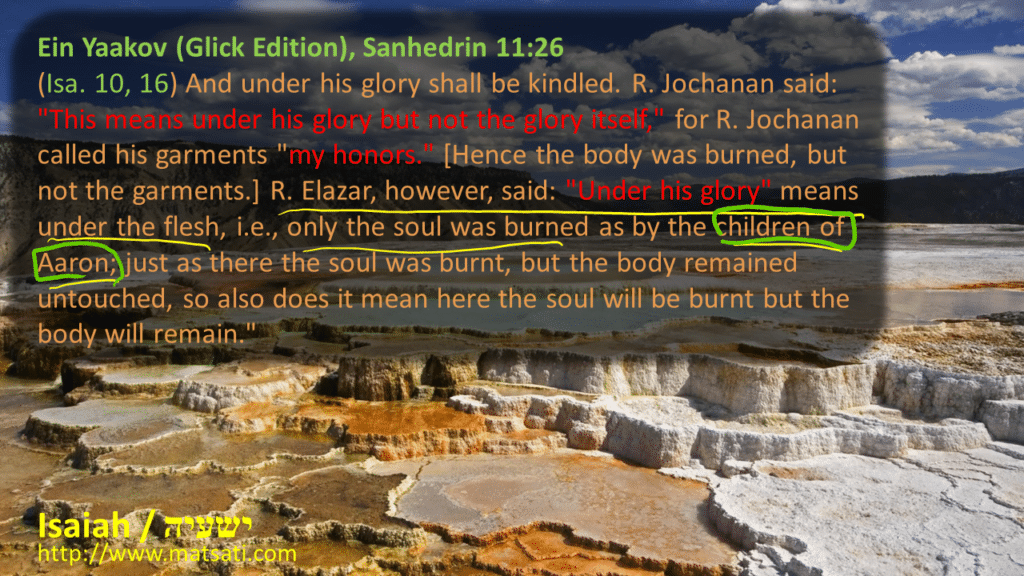
Ein Yaakov (Glick Edition), Sanhedrin 11:26
(Isa. 10, 16) And under his glory shall be kindled. R. Jochanan said: “This means under his glory but not the glory itself,” for R. Jochanan called his garments “my honors.” [Hence the body was burned, but not the garments.] R. Elazar, however, said: “Under his glory” means under the flesh, i.e., only the soul was burned as by the children of Aaron; just as there the soul was burnt, but the body remained untouched, so also does it mean here the soul will be burnt but the body will remain.”
We note the connection to Nadav and Avihu according to Vayikra / Leviticus 10:1-2.
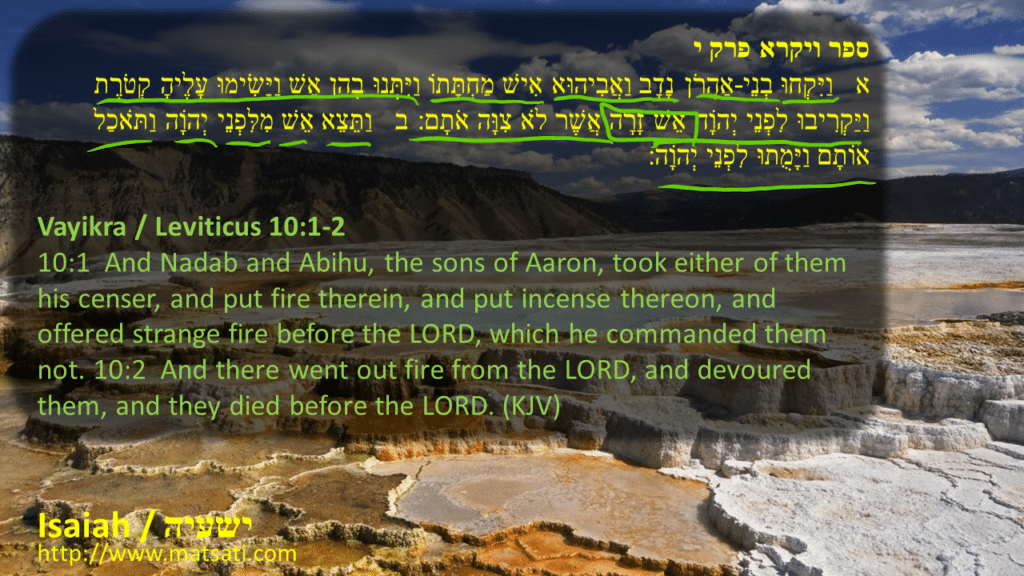
ספר ויקרא פרק י
א וַיִּקְחוּ בְנֵי-אַהֲרֹן נָדָב וַאֲבִיהוּא אִישׁ מַחְתָּתוֹ וַיִּתְּנוּ בָהֵן אֵשׁ וַיָּשִֹימוּ עָלֶיהָ קְטֹרֶת וַיַּקְרִיבוּ לִפְנֵי יְהוָֹה אֵשׁ זָרָה אֲשֶׁר לֹא צִוָּה אֹתָם: ב וַתֵּצֵא אֵשׁ מִלִּפְנֵי יְהוָֹה וַתֹּאכַל אוֹתָם וַיָּמֻתוּ לִפְנֵי יְהוָֹה:
Vayikra / Leviticus 10:1-2
10:1 And Nadab and Abihu, the sons of Aaron, took either of them his censer, and put fire therein, and put incense thereon, and offered strange fire before the LORD, which he commanded them not. 10:2 And there went out fire from the LORD, and devoured them, and they died before the LORD. (KJV)
This is paralleled to Isaiah 10:16 טז חְלָף דְאִתרָרַב מַלכָא דְאַתוּר בְכֵין יְשַלַח רִבֹון עָלְמָא יוי צְבָאֹות בְרַברְבֹוהִי מַחָא וּתחֹות יְקָרְהֹון מֵיקָד ייֵקְדוּן כִיקֵידַת אַשָא׃ ותחות יקרהון דאינון יקרהון דבני נשא 10:16 Because the king of Assyria magnifies himself, therefore the Lord of the world, the Lord of hosts, shall send among his princes a blow; and beneath the vessels of their glory, they are utterly burned up like the burning of a fire. (TgJ) The rabbis discuss how God’s glory destroys, that it wasn’t the garments that were burned, it wasn’t the body that was burned, it was the soul inside of the body that was burned. These things reveal to us that the Lord works from the inside out. This is consistent with the notion of Tsaraat being manifest due to the sin that is on the inside, that sin depending upon how great it is works its way out to manifest itself in the body. The body could be considered the house of the soul, and so the affliction coming to the house first is a consistent analogy. When we consider Nadav and Avihu, they assumed what they did was fine. We note that what Nadav and Avihu were doing, they were bringing a sacrifice of incense and the text states that they put strange fire in their censors. This suggests they did not use fire from the altar of God. So, their attempt to bring an offering before God was something of their own making. We note that their doing this, spiritually, intellectually, and emotionally they thought this was ok for them to do, that they could praise the Lord God in the way of their own making, and this was ok. When it comes to praising the Lord God in heaven, we give God praise due to His blessings in our lives, such as receiving a bonus at work, or due to just observing the beauty of God’s creation, we can proclaim His glory and work and covenant faithfulness. We note the connection to Romans 12:1-3, of being a living sacrifice to the Lord. This may be done to give God praise for the work that He is doing in our lives, this is related to the way a person acts or behaves. Torah based example is Pinchas son of Eleazar in the Torah. What Nadav and Avihu reveal to us is that not all of our actions are acts of praise. There are those who believe that their homosexual lifestyles are a way to give blessing and praise to God. This is obvious based on most all major denominations in Christianity have gay clergy. These men and women are up on the pulpit, teaching the Word of God and living a life of sin. What Nadav and Avihu teach us is that death comes to those who presume they can disobey God’s command and praise God through disobedience. Note this is the end result of the theologies that teach the Torah is done away with. In Isaiah we have been reading a lot about leadership. In Jewish leadership, the leader is a representative of the entire nation. He is inspired by his people, and the people are inspired by him. Note what happens when one has a leader of a congregation who is practicing unrepentant sin and suggesting through his alternative lifestyle that violating God’s commands is something that one can glorify God. We note that after the tragedy of Nadav and Avihu, Moshe tells Aharon: וַיֹּאמֶר מֹשֶׁה אֶל-אַהֲרֹן הוּא אֲשֶׁר-דִּבֶּר יְהוָֹה | לֵאמֹר בִּקְרֹבַי אֶקָּדֵשׁ “and Moshe said unto Aaron, this is what Hashem said: by those close to me, I will be sanctified.” We note the significance of this statement, to whom does the phrase “my close ones” refer? Are these not those who make it their life’s ambition to teach God’s Word and to lead others? How was Hashem to be sanctified through such people? If Nadav and Avihu are the subject of these words, it suggests that even in death they were considered holy. If so, though, why were they punished so severely? Should they be considered sinful or beloved? We note that the modern application of these Scriptures is significant especially for those who are in positions of leadership and who are actively disobeying God’s commands and teaching others to do so!
Isaiah continues saying according to the TgJ, יז וִיהֵי מָרֵיה נְהֹורֵיה דְיִשׂרָאֵל וְקַדִישֵיה מֵימְרֵיה תַקִיף כְאִישָתָא וּפִתגָמֹוהִי כְשַלהָבִיתָא וִיקַטֵיל וִישֵיצֵי שִלטֹונֹוהִי וְטוּרנֹוהִי בְיֹומָא חַד׃ 10:17 And there shall be the Lord, the Light of Israel, and His Holy One, His WORD, strong as fire, and His word as a flame; and it shall slay, and make an end of his rulers and of his governors in one day. יח וִיקָר עַם סְגֵי מַשרְיָתיֵה וְעָבְדֵי קְרָביֵה נַפשְהֹון עִם פַגרְהֹון יְשֵיצֵי וִיהֵי תְבִיר וְעָרִיק׃ 10:18 And it shall consume the glory of the multitude of his army, and their souls with their bodies, and he shall be broken, and be a fugitive. יט וּשאָר עָבְדֵי קְרָבֵיה יְסוּפוּן לְמִהוֵי עַם דְמִניָן וּמַלכוּ חַלָשָא יִתחַשבוּן׃ 10:19 And the rest of his warriors shall come to an end, that the people shall be a small number, and they shall be reckoned a weak kingdom. כ וִיהֵי בְעִידָנָא הַהוּא לָא יֹוסְפוּן עֹוד שְאָרָא דְיִשׂרָאֵל וְשֵיזָבַת בֵית יַעְקֹב לְאִסתְמָכָא עַל עַמְמַיָא דַהְוֹו מַפלְחִין בְהֹון וְיִסתַמכוּן עַל מֵימְרָא דַיוי קַדִישָא דְיִשׂרָאֵל בִקשֹוט׃ 10:20 And it shall come to pass in that time, that the remnant of Israel, and such as are escaped of the house of Jacob, shall no more again lean on the people whom they served; but they shall lean upon the WORD of the Lord, the Holy One of Israel, in truth. (TgJ) The idea is that Israel is called to rely upon the Lord, but they did not rely upon him in Emet (Truth). The TgJ states that the remnant will rely upon the Lord, the Holy One of Israel. The issue was the people would waver between trusting in God and trusting in men. The people needed to lean on God with unwavering steadfastness and loyalty. According to various biblical passages, one should serve God in אֱמֶֽת / emet, 1 Samuel 12:24, 1 Kings 2:4, 3:6, 2 Kings 20:3, and Isaiah 38:3. To be faithful means to walk before Him with constancy. David wrote that God is near to all of those who call upon Him in truth (אֱמֶֽת, Tehillim / Psalms 145:18, קָר֣וֹב יְ֭הוָה לְכָל־קֹרְאָ֑יו לְכֹ֤ל אֲשֶׁ֖ר יִקְרָאֻ֣הוּ בֶאֱמֶֽת׃). Here the Psalmist coupled to the Isaiah text we can understand that God is near to all who call upon Him in truth and trust, in a spirit of unquestioning reliance! This is the essence of what man’s faithfulness to God should look like. The expression of truth (אֱמֶֽת) is what we know in our heart to be good and right. The best source for pure truth and righteousness is God, this is why it is important to have God’s presence dwell in our midst! Samuel said according to 1 Samuel 12:24, “Only fear the Lord and serve Him in truth with all your heart; for consider what great things He has done for you.” When Samuel describes serving God in truth, this means that we are to do so with the purest intentions. These are the things that were missing in the people’s lives in Isaiah’s day. These things reveal to us that our faith should be centered in truth with the purest intentions!
